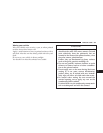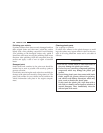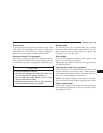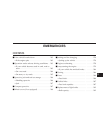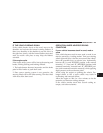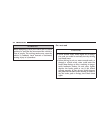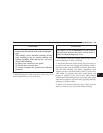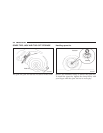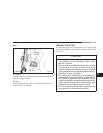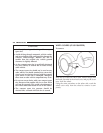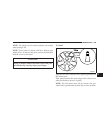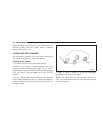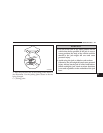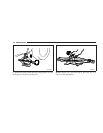
CAUTION!
•
When driving in rain, a layer of water may form
between the tires and the road surface (hydroplan-
ing).
This reduces a tire’s frictional resistance on the
road, resulting in loss of steering stability and
braking capability. When driving on a wet road,
observe the following:
(a) Drive your vehicle at a safe speed.
(b) Do not drive on worn tires.
(c) Always maintain the specified tire inflation
pressures.
On snowy or icy roads
1. When driving on a road covered by snow or ice, it is
recommended that you use snow tires.
CAUTION!
Tire chains are not recommended for your vehicle.
The clearance between the chains and the body is
small, and body damage may occur.
2. Drive slowly. Avoid any sudden starts or stops, abrupt
brake application or sharp cornering.
3. Depressing the brake pedal during travel on snowy or
icy roads may cause tire slippage and skidding. When a
skid occurs, take your foot off the accelerator. Steer gently
into the skid. Braking will differ, depending upon
whether you have anti-lock brakes (ABS). If you do have
ABS, brake by pressing the brake pedal firmly, and
keeping it pressed. If you do not have ABS (vehicles
without anti-lock braking system) pump the brake pedal
with short rapid jabs, each time fully applying and fully
releasing for greatest effect.
4. Allow extra distance between your vehicle and the
vehicle in front of you, and avoid sudden braking.
EMERGENCIES 265
8



